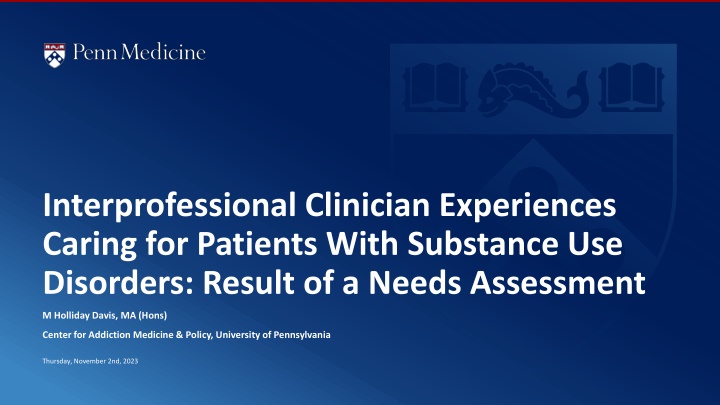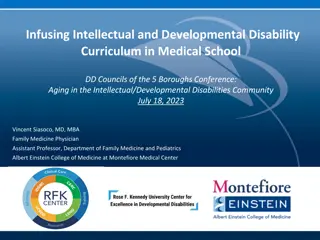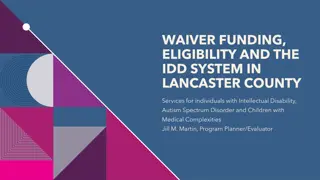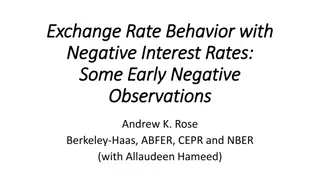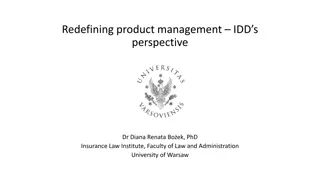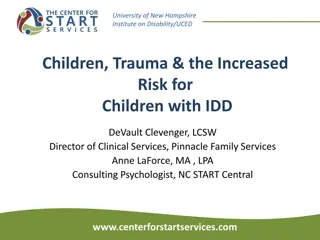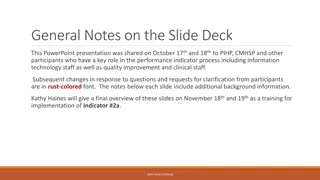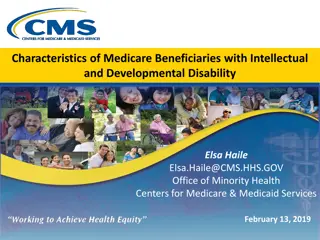The Resource Exchange: Improving Health Care for IDD Community
Community organization established in 1964 to provide Home and Community Based Services in El Paso, Park, and Teller counties. Focus on supporting patients with Intellectual and Developmental Disabilities (IDD) through services like navigation, quality service coordination, and early intervention. Aims to bridge gaps in mental and behavioral health care, enhance provider knowledge, and improve transitions between pediatric and adult care.
Download Presentation

Please find below an Image/Link to download the presentation.
The content on the website is provided AS IS for your information and personal use only. It may not be sold, licensed, or shared on other websites without obtaining consent from the author.If you encounter any issues during the download, it is possible that the publisher has removed the file from their server.
You are allowed to download the files provided on this website for personal or commercial use, subject to the condition that they are used lawfully. All files are the property of their respective owners.
The content on the website is provided AS IS for your information and personal use only. It may not be sold, licensed, or shared on other websites without obtaining consent from the author.
E N D
Presentation Transcript
Interprofessional Clinician Experiences Caring for Patients With Substance Use Disorders: Result of a Needs Assessment M Holliday Davis, MA (Hons) Center for Addiction Medicine & Policy, University of Pennsylvania Thursday, November 2nd, 2023 Penn Medicine
I do not have any conflicts of interest to disclose. Penn Medicine
Background Hospitalizations among PWUD are growing, and these patients face numerous barriers to care and significant stigma in hospital settings.1 Addiction consult services (ACS) are growing strategy to improve patient outcomes and support interprofessional teams providing addiction care.2 1. Serowick, 2021; Biancarelli, 2019; Beanot, 2019; Ronan 2016 2. Hervera, 2023; Englander, 2023; Wakeman, 2021 Penn Medicine
Objective Prior to the implementation of an ACS at one Penn Medicine hospital, we conducted a needs assessment with interprofessional teams. 4 Penn Medicine
Design: Web-based, cross-sectional survey of hospital-based providers at a single urban safety net hospital in Philadelphia Participants: Inpatient attending and resident physicians, APPs, and nurses Methods March of 2023 Analysis: Results analyzed using descriptive statistics Penn Medicine
Methods SURVEY DOMAINS Frequency of SUD care Preparation for and comfort with aspects of SUD care Attitudes towards patients with SUD Barriers to providing care to PWUD Penn Medicine
Participant characteristics Total N=236 Attending Physicians n=36 APPs n=14 Resident Physicians n=128 Nurses n=58 Participant characteristics p-value Gender Female 72% 70% 93% 63% 86% p=0.004 Male 27% 31% 7% 36% 9% Other 2% 0% 0% 1% 5% Race Black 14% 0% 14% 9% 33% White 58% 55% 71% 67% 36% Asian 19% 33% 7% 17% 16% Other 9% 11% 7% 6% 16% p<0.001 p=0.193 8% 3% 0% 12% 7% Hispanic/Latine Ethnicity Close Friend or Family with SUD 28% 8% 36% 28% 38% Yes 64% 83% 50% 66% 50% No 8% 8% 14% 5% 12% Did not Answer p=0.023 Penn Medicine
Nurses, proportion reporting somewhat or very comfortable 90% 84% 80% 83% 83% 81% 70% 60% 55% 50% 40% 41% 38% 36% 30% 20% 10% 0% Assess for opioid withdrawal Assess for Alcohol Withdrawal Administer methadone in the hospital Provide wound care for wounds related to IVDU Counsel patients on naloxone Counsel patients on safer drug use practices Address in- hospital drug use Counsel patients on safer ways to drink alcohol Penn Medicine
Prescribers, proportion reporting somewhat or very comfortable 100% 90% 94% 92% 90% 80% 78% 70% 60% 50% 40% 41% 41% 38% 30% 31% 20% 10% 0% Assess for opioid WD Assess for alcohol WD Diagnose SUDs Discuss MOUDs Counsel patients on safer ways to drink alcohol Counsel patients on safer drug use practices Address in- hospital drug use Connect patients to outpatient SUD Penn Medicine treatment
Attitudes towards SUDs/PWUD SUDs are treatable Patients with SUD are more challenging to care for than patients w/o SUD I feel unsupported in caring for patients with SUDs Caring for patients with SUDs is one of the most difficult parts of my job I feel manipulated by my patients with SUDs I worry about worsening or enabling addiction in my patients -200 -150 -100 -50 0 50 100 150 200 250 Penn Medicine Strongly disagree Disagree Neither agree nor disagree Agree Strongly agree
Barriers to Addiction Care 90% 84% 80% 70% 68% 60% 56% 50% 53% 40% 36% 30% 32% 20% 19% 19% 10% 0% Patient social barriers Availability of resources after discharge Expert Consultation Access to harm reduction resources Access to peer support Knowledge about pain management in patients with SUD Guidelines for managing OUD Knowledge about SUD tx Penn Medicine
Results Caring for PWUD was cited as a significant contributor to burnout in all groups Respondents felt unprepared to provide specialized SUD interventions and care linkages Respondents felt prepared to treat SUDs & agreed that they are treatable Barriers included a lack internal and external resources Penn Medicine
The study took place in a single hospital setting in a single city with a relatively small sample Lack of patient perspective Limitations Penn Medicine
Other limitations include the lack of gender, race & ethnic diversity in our sample & study team Implications for the workforce of people caring for people with SUD Diversity, Equity & Inclusion Penn Medicine
Our findings were consistent with what has been reported in the literature Health care workforce retention & burnout is increasingly becoming a concern for health systems Our next step at Penn Med includes a follow up survey to examine whether our ACS has addressed the perceived barriers to care for people hospitalized with SUD Conclusion Penn Medicine
Acknowledgements Margaret Lowenstein, MD, MPhil, MSHP Funding: NIDA K23DA055087 LDI-Penn Medicine Research Lab Judy Chertok, MD Shoshana Aronowitz, PhD, MSHP, FNP-BC Rachel French, PhD, RN Jeanmarie Perrone, MD Ashish Thakarar, MD J. Deanna Wilson, MD, MPH Lilah Lesniak, BA Penn Medicine
Attitudes towards SUDs/PWUD SUDs are treatable Patients with SUD are more challenging I have witnessed compromised care due to lack of I have felt distress when witnessing stigmatizing Caring for patients with SUDs contributes to burnout There have been times i have had to provide SUD care I I don't have enough time to care for patients with SUDs I feel unsupported in caring for patients with SUDs Caring for patients with SUDs is one of the most difficult I feel manipulated by my patients with SUDs I worry about worsening or enabling addiction in my -200 -150 -100 -50 0 50 100 150 200 250 Strongly disagree Disagree Neither agree nor disagree Agree Strongly agree Penn Medicine
Attitudes by group Proportion somewhat or strongly agreeing 400% 350% 96% 300% 80% 84% 250% 84% 78% 74% 52% 56% 59% 200% 53% 55% 34% 59% 40% 35% 41% 28% 150% 93% 100% 43% 86% 47% 50% 48% 38% 64% 71% 100% 79% 57% 57% 50% 43% 57% 50% 92% 86% 83% 72% 64% 53% 47% 44% 42% 42% 31% 0% SUDs are treatable Patients with SUD are more challenging to care for than patients w/o addiction I have witnessed compromised care due to lack of support for addiction treatment I have felt distress when witnessing stigmatizing treatment of patients w/ SUD Caring for patients with SUDs contributes to burnout for me There have been times i have had to provide SUD care I did not feel qualified caring for I don't have enough time to care for patients with SUDs I feel Caring for patients with SUDs is one of the most difficult parts of my job I feel I worry about worsening or enabling addiction in my patients manipulated by my patients with SUDs unsupported in caring for patients with SUDs Attendings APPs Nurses Residents Penn Medicine
Nurse Comfort with Addiction Care 90% 84% 83% 83% 80% 81% 81% 78% 70% 69% 60% 55% 50% 40% 41% 38% 36% 30% 20% 10% 0% Assess for opioid withdrawal Assess for Alcohol Withdrawal Administer methadone in the hospital Recognize SUDs Provide wound care for wounds related to IVDU Administer buprenorphine in the hospital Address acute pain in patient with SUD Counsel patients on naloxone Counsel patients on safer drug use practices Address in- hospital drug use Counsel patients on safer ways to drink alcohol Penn Medicine
Physician/APP Comfort with Addiction Care 100% 94% 90% 92% 90% 80% 78% 77% 70% 66% 66% 60% 50% 49% 40% 43% 41% 41% 38% 30% 31% 20% 10% 0% Assess for opioid WD Diagnose SUDs Counsel patients on naloxone Initiate methadone in the hospital Determine an appropriate LOC for SUD Counsel patients on safer drug use practices Connect patients to outpatient SUD treatment Penn Medicine
Barriers to Addiction Care 90% 84% 80% 70% 68% 60% 56% 53% 50% 47% 46% 40% 36% 30% 32% 20% 19% 19% 10% 0% Patient social barriers Availability of resources after discharge Expert Consultation Access to harm reduction resources Social Work support Patient interest in treatment Access to peer support Knowledge about pain management in patients with SUD Guidelines for managing OUD Knowledge about SUD tx Penn Medicine
Rank order of those reporting 'Significant Barrier' Rank order of those reporting 'Significant Barrier, comparison 350% 300% 91% 250% 77% 66% 60% 200% 43% 34% 57% 49% 38% 150% 52% 32% 19% 86% 41% 86% 16% 34% 100% 57% 71% 57% 13% 17% 20% 57% 79% 9% 7% 36% 50% 36% 89% 81% 43% 69% 61% 53% 50% 39% 36% 28% 19% 0% Patient social barriers Availability of resources after discharge Expert Consultation Access to harm reduction resources Social Work support Patient interest in Access to peer support Knowledge about pain management in patients with SUD Guidelines for managing OUD Knowledge about SUD tx treatment Penn Medicine Attendings APPs Nurses Residents
